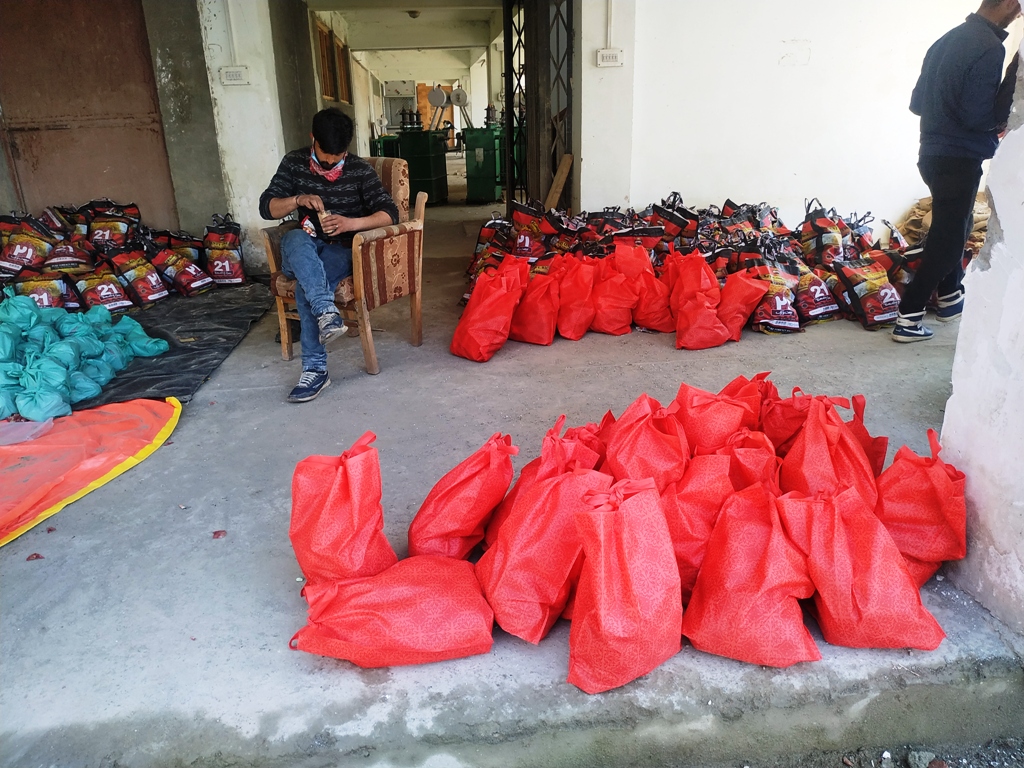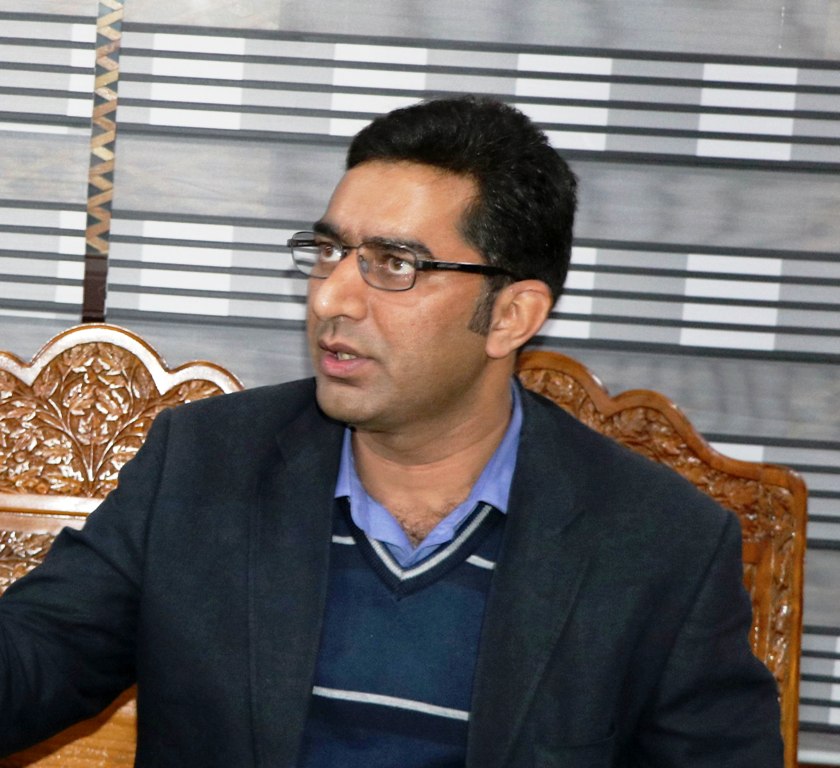In order to ensure that footfalls on streets remain at the lowest, the administration in Srinagar is delivering essentials to families at their doorsteps. The operation is elaborate and complicated but a huge game-changer, reports Tasavur Mushtaq

A long alley, narrow and unpaved, leads to the single-storey house of Abdul Hamid in Srinagar. A bus conductor by profession, the 40-year-old, has always found it difficult to make ends meet on his meagre income, roughly Rs 250 a day. After August 5 last year, when Kashmir’s special status was scrapped, his difficulties doubled. Somehow he managed to prevent hunger at home by selling used clothes on a hand cart. His wife, Shameema contributed by way of sorting, ironing and even washing the stuff to be sold.
Barely half a year later, Hamid has once again lost his source of livelihood, this time because of the pandemic that froze life everywhere. With supplies suspended, Coronavirus has deprived his leftover stock of its buyers. Nobody is willing to buy imported used clothes anymore. All his savings have been exhausted, making it increasingly difficult for him to manage two square meals a day for his family. He preferred not to talk about it to anyone. However, feeling adrift and forlorn, the sight of his children and possible hunger made him impatient.
Hamid saw a ray of hope when he came across helpline numbers being displayed by the government for possible assistance. He dialled the number. After two hours, Hamid said, he was delivered a packet of essentials. “I felt the help came from heaven. I had no other option”, he told Kashmir Life.
Reaching out
After the outbreak of the pandemic, as the lockdown was announced, Srinagar’s administration came up with an innovative idea: To serve essentials at the doorstep.
“The district administration wanted to ensure essentials at the doorstep and ensure people stay at home,” Syed Sajjad Qadri, an additional district magistrate in the office of Deputy Commissioner (DC) Srinagar said. Deputy on special duty, Qadri manages the distribution of food grains, LPG and other essentials, an experiment that is “first of its kind in the country.”

Understanding the possible difficulties of the population in the wake of lockdown, a team led by DC Dr Shahid Choudhary decided to arrange the supply of essentials for roughly 2.61 lakh families in Srinagar. It was a daunting task. The strategy was devised in a phased manner. Initially seeking to deliver supplies to ration ticket holders, the team divided Srinagar into 34 subzones.
The first round to deliver ration started in six subzones, Habak, Hawal, Hazratbal, Rajbagh, Rambagh and Mehjoor Nagar, where the officials said the concept worked nicely.
The second phase catered to 16 subzones and subsequently, other subzones were covered. “It was entirely a smooth process and by and large people cooperated,” said Qadri.
However, the government was soon confronted with the need to supply to households without a ration ticket. They were people who had migrated from rural areas, had a job in the city, or were the students attending private tuitions.
Acting on complaints from these areas, Qadri said specific help-lines, 9018249426 and 8825010324 were dedicated to this segment and their calls were considered as ration tickets.
Non Local Workers
While catering to the two diverse segments successfully, the administration soon felt the need to look after non-local workers stuck in the city. The government intervened and divided them into two segments: organised and unorganised.

Organised labourers belonged to seven industrial estates operational in Khonmoh, Rangreth, Sanat Nagar, Shalteng, Zainakote, Bagh Ali Mardan Khan and Zakura. The number as revealed by the sources is 2360. The job to distribute ration was assigned to respective estate officers.
As for the labourers in the unorganised sector, the government assigned the job to the magistrates (Tehsildars). Their number turned out to be around 14330. In the initial phase, food packets included four Kg of rice per soul were distributed among them.
Patients In Distress
Apart from this, the government dedicated separate help-lines for people in distress like old, poor and needy. The rush forced the administration to increase initially established three helpline numbers to 15. The items, Qadri said were delivered free of cost.
“The government did not charge anything from people in distress and need,” Qadri said.

To manage the availability of the medicine to old and ailing the government, Qadri said, established another set of helpline numbers. “We roped in different chemists and druggists to supply the medicines based on request calls.”
Mir Wasim, an official, has been assigned the job to take calls on his number 7006115704 for the life-saving drugs
The officials associated with this process in the office of District Magistrate said that in certain cases even the affluent people did not pay for the medicines. “As we have orders not to ask for money from people in distress, the ones who could afford should have paid,” said a lower rung official wishing anonymity.
Regarding the packets supplied to people in distress, the officials said they convey the number to distributors and they keep the order ready. “Our Covid-19 special vehicles pick the packets and deliver them.”
Crucial LPG
The LPG distribution was another challenge. The mechanism devised was to rope in the agencies involved which already have mobility and enough understanding of the areas they serve.
The roster was put in place for three main LPG companies operating in Srinagar. “We again divided the city into different areas and accordingly conveyed to LPG companies,” said Qadiri.
“We directed them on a particular day say HP LPG’s would be delivered and the following day IOC. This helped us to minimize the footfall and ensure the proper supply.”
Grocery
The administration came out with an order for 25 departmental stores to deliver groceries. This idea, the officials insist, made Srinagar the first city in India to adopt this practice.
The departmental stores spread across the city were given an operational area of a radius of 3 kms and one official from the government to supervise the process. “We gave passes to one person of the store and attached one official from the government to regulate the process,” said Qadri. The official, Qadri said, was designated to ensure “no store resorts to black marketing, profiteering and also see stocks are replenished on a regular basis.”

One of the store owners operating under the government order said that they are managing important items on a priority basis. “If somebody places order for beauty products and other person wants edible oil, we give priority to the latter,” he said. The owner added: “We take orders and process them. The following day, we send our boy to deliver at respective places.”
At times, there were complaints about certain stores not taking orders if below Rs 3000. A local residing in Nowshehra area of Srinagar accused that a nearby store owner designated by the government noted down the order. Later, he neither delivered it nor received the call.
The government, Qadri said, is stern in dealing with such misadventures. “As these cases were reported to us, we immediately took action and reprimanded the owners,” he said. “If there are any other such complaints, people should report.”
Non-government help
When disasters hit, people come out to help. Kashmir has a legacy of social workers and the non-government organizations (NGO), working in the field to mitigate the difficulties of people. This time too, the organizations and individuals have come out to deal with the situation.
DC Srinagar, however, has a word of caution for them. “A number of NGOs are doling out relief. While appreciating their efforts we must underline it’s not a normal relief framework. We need to minimise footprint. Pl get in touch with DDMA (District Disaster Management Authority) for organised efforts,” he tweeted.

Explaining the rationale, an official in DDMA said the current situation is different. “These days even a person distributing supplies could be a carrier and a possible threat. Private persons are more vulnerable. We send our men with proper instructions,” he said.
Qadri, while speaking about the issue, said that the administration requested these volunteer organizations to coordinate with district administration. “What is the point in doubling the efforts for the same set of population,” he said. “They are not cooperating.”
Eyewitness Explains
In Kashmir, the Department of Food, Civil Supplies, and Consumer Affairs are entrusted with the responsibility of delivery of essential supplies like rice, wheat, sugar, kerosene oil under the Public Distribution System. Out in the field, the men of the department manage the distribution monthly. However, as the pandemic struck and administration in Srinagar decided to reach out to inhabitants, the men and machinery of the department were on toes.
Kashmir Life talked to a few on the ground. They insisted not to be named. Let us call one of them, Mr A.
A storekeeper, Mr A, commonly known as Gaath Munish, leaves home at 7 am to his workplace in the uptown and reaches back by 9 pm in the night. His days, he says are very hectic. Managing the distribution at the doorstep in the stipulated time, he says is challenging. However, given the crisis, he feels, beyond duty it is an obligation. “It gives me satisfaction to be of some help in these trying circumstances.”

KL Image by Bilal Bahadur
Talking about executing home-delivery orders, Mr A, explains the process. On one day, he visits every household of his area, takes cash and gives them the receipt. The following day, he says, a load carrier is hired and he accompanies the driver along with labourer and delivers the allotted quota to each household.
Happy to oversee the distribution in these trying times, Mr A has a regret, as well. “People at times turn violent and hurl abuses even in this crisis,” he said, suggesting, “cooperation in crisis is the only way out.”
As he talked about his days in the field, he fears for his life. “We don’t have protective gear to deal with the public. In a day see how many gates we open and how many people we meet.”
“We have an area where almost 95 per cent of people belong to the elite class and yet there is around 45 per cent BPL list. And we have another area where there are 98 per cent of people downtrodden but the list of APL is nearly 40 per cent.” This he says is a problem and injustice as well.
But as soon as he reaches home late evening, his first thing is to take a bath and change clothes. “My parents are old and ailing. I fear for them and myself.”















